
About PIP
Each college and university involved with PIP is required to write and implement a strategic plan for prevention in order to decrease problematic health and safety behaviors on campus and in their community. Funding is provided to each campus affiliated with the PIP coalition. To identify progress of their goals, and to obtain data for program implementation, each campus implements the Missouri Assessment of College Health Behaviors (MACHB), an annual, online survey implemented each spring semester since 2007.
Member Institutions
- Columbia College
- Crowder College
- Drury University
- Evangel University
- Harris-Stowe State University
- Jefferson College
- Maryville University
- Missouri Southern State University
- Missouri State University
- Missouri Western State University
- Northwest Missouri State University
- Rockhurst University
- Saint Louis University
- St. Louis Community College
- Southeast Missouri State University
- State Technical College of Missouri
- Truman State University
- University of Central Missouri
- University of Missouri
- University of Missouri-Kansas City
- Missouri University of Science and Technology
- University of Missouri-St. Louis
- Washington University
- Westminster College
- William Woods University
*Denotes funding source
Our Mission & History
Partners in Prevention’s mission is to create a campus, city, and state environment that supports positive health and safety behaviors by the college students who attend higher education institutions in the state of Missouri. Since 2000, PIP's primary focus is on decreasing at-risk drinking by students on Missouri's college and university campuses. Since its founding, PIP has provided training and networking to its members through monthly meetings, assisted in developing a campus-community coalition on each member campus, annual evaluation of alcohol and drug use behaviors and related consequences, and drive-in workshops and conferences. Each campus in Missouri Partners in Prevention writes an annual strategic plan for prevention, guided by data, to identify those problems and strategies most relevant for their campus communities.
In addition to PIP’s work with high risk drinking, Partners in Prevention also provides technical assistance and support to campuses on issues such as underage drinking, suicide prevention and college student mental health, safe driving behaviors, problem gambling, and tobacco cessation and prevention.
Partners in Prevention is funded by the Missouri Division of Behavioral Health with additional funding from the Missouri Department of Transportation's Highway Safety Division, the Missouri Department of Mental Health Suicide Prevention Project, SAMSHA’s Garrett Lee Smith Suicide Prevention program, the Missouri Department of Public Safety’s Enforcing Underage Drinking Laws Training Program.
Goals
Purpose
To create a state-wide coalition of public institutions of higher education in Missouri and relevant state agencies (the Missouri Division of Behavioral Health, Missouri Department of Liquor Control and the Missouri Division of Highway Safety) to Collaboratively develop strategies for reducing and preventing high-risk drinking among Missouri college students. The goals are as follows:
- To establish a communication network among the public institutions of higher education in Missouri and state agencies to create effective strategies for addressing the misuse of alcohol and other drugs among Missouri college students.
- To provide on-going training opportunities for higher education professionals and students on the effective prevention of alcohol and other drug misuse among Missouri college students.
- To facilitate evaluation efforts including an environmental assessment, needs assessments, establishment of baseline data of students' AOD usage patterns, and measuring the effectiveness of policy changes and program implementation over the grant period.
- To provide resources that the campuses can access in order to create on-going, creative and effective prevention efforts.
Outcomes
- An increase in the number of campus/community coalitions throughout the state.
- An increase in the skill level of those students and professionals who participate in training opportunities.
- To collect baseline data on students at all participating Missouri colleges and universities.
- A decrease in availability of alcohol to college students.
- An increase in the number of alternative, alcohol free programming on the participating campus communities.
- A decrease in student drinking rates including; binge drinking, average number of drinks per week and number of times students drink per week.
- A decrease in the negative consequences of binge drinking including violence.
- An increase in the accuracy of students' perception of their peer's AOD use.
Recognition for PIP
In 2009 Partners in Prevention was the recipient of CADCA's 2009 Got Outcomes! Coalition of Excellence Award, winning in the Coalition in Focus category, which recognizes coalitions that demonstrate contributions to communitywide declines for one substance-related issue.
See the feature story here: http://www.cadca.org/resources/detail/got-outcomes-feature-missouri-partners-prevention
In 2008, the National Prevention Network recognized the work of Partners in Prevention with the 2008 National Exemplary Award for Innovative in Substance Abuse Prevention Programs, Practices, and Policies. For more about the National Prevention Network, click here.
Prevention Approaches
PIP uses evidence-based programs that yield results, focusing on four approaches to promote healthy decisions with alcohol. The four approaches are prevention education, social norming, harm reduction programs and environmental management. PIP also works with statewide programs that focus on smoking cessation, safe driving, gambling misuse prevention and suicide prevention.
We do not recommend that campuses use a single prevention approach, but rather implement a comprehensive plan for prevention which includes multiple approaches.
The following are evidence-based, best-practice strategies that Partners in Prevention recommends for its member campuses:
Brief Alcohol Screening and Intervention for College Students
- PIP recommends that alcohol policy violators take part in a screening and intervention process that allows the student to consider changing their drinking behavior
- Programs such as BASICS also allow for the clarification of norms as well as the detection, intervention, and referral of at-risk students
Alcohol Policy/Law Enforcement
- DWI Saturations
- Underage Drinking Saturations
- Clear, consistent, and on-going policy enforcement in residence halls and Greek organization housing
Norms Clarification
- Since most college students overestimate how much their peers consume alcohol, PIP recommends campuses use social norms marketing to educate the student population about the true drinking behaviors of students
- Social norms marketing can also be paired with educational presentations or on-line education which clarifies norms
Complimentary Education Practices
- Avoid the use of scare tactics
- Utilize best practices in campus-based message framing
- Practice “positive” marketing practices
Strategic Planning
- Annual data collection
- Annual strategic planning:
- Identification of campus specific needs
- Recognition of campus specific resources
- Implementation of programs that match campus specific needs and resources
- Identification and appropriation of programs to target populations if appropriate
Environmental Management Practices
- Utilize these Social Ecological Framework (3 in 1 philosophy) which addresses:
- Individual students
- Student population as a whole
- Broader college and community environment
- Provide alcohol free options and events to combat traditional drinking dates, times, events and venues
- Review and implement appropriate campus specific access to alcohol restrictions
- Establish and collaborate with:
- Campus alcohol prevention task forces
- Campus/community alcohol prevention coalitions
- Statewide Partners in Prevention Coalition
Our Initiatives
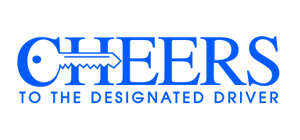
CHEERS
Bars, restaurants and nightclubs participating in CHEERS provide FREE non-alcoholic beverages to the acknowledged designated driver in a group of two or more.
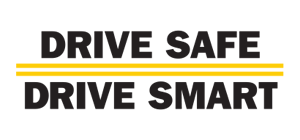
Drive Safe Drive Smart
PIP member campuses and the Missouri Department of Transportation are driven to help Missouri's college students Drive Safe Drive Smart.
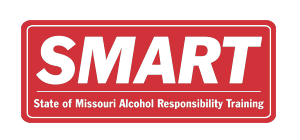
The State of Missouri Alcohol Responsibility Training (SMART)
The State of Missouri Alcohol Responsibility Training (SMART) program is an interactive, web-based course available free of charge to those who own or work for any Missouri establishment licensed to sell alcohol.
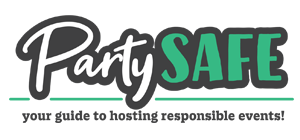
Party Safe
Party Safe will increase your skills and knowledge in planning and hosting a successful, fun, and safe event of any kind.

Gambling
It is important for people to understand that gambling is not a risk-free activity and that it is becoming increasingly important to learn risk factors, warning signs and strategies to protect yourself or someone you care about.
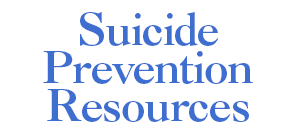
Suicide Prevention Resources
Suicide Prevention Resources is an online network committed to suicide prevention on Missouri's public school campuses.
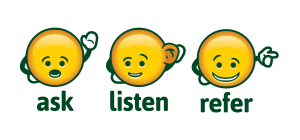
Ask Listen Refer (ALR)
Ask Listen Refer is an online suicide prevention training tool that takes about 20 minutes to complete. The program addresses the need to educate students, faculty, staff, and parents about suicide prevention, and also addresses the need to have suicide prevention resources in an online format. The goal of this program is to educate students, faculty and staff on how to ASK is someone is thinking about suicide, LISTEN to their response and REFER them to a professional.
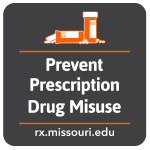
RX Initiative
rescription drug misuse is a quickly growing and largely unaddressed problem concerning college students. With this RX Initiative, we hope to educate students on the dangers of prescription drug misuse as well as provide safe and healthy alternatives.
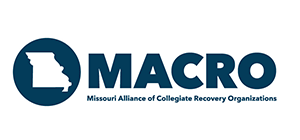
Missouri Alliance of Collegiate Recovery Organizations (MACRO)
MACRO, the Missouri Alliance of Collegiate Recovery Organizations, is a statewide initiative to support addiction recovery efforts on college campuses. With support from the Missouri Department of Mental Health, MACRO provides resources, networking opportunities, and financial support for schools as they start and grow their own recovery support services.

Missouri Show Me Retailer Training
The Missouri Show Me Retailer Training was developed to provide the information and tools necessary for retailers that sell tobacco and nicotine products to comply with the federal, state, and local laws.

Engage
Engage is a violence prevention training designed to encourage students to contribute to a culture of care and create a safer campus community.